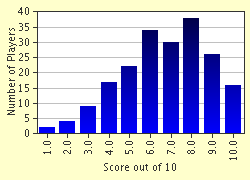Quiz Answer Key and Fun Facts
1. When reading literature from Columbus' day, you will find that the language is a little different. Which of the following is an archaic form of "vi" (I saw) that can be found in conquest and pre-conquest literature?
2. In Spanish today you have instances where two words join together to form one word, such as "de + el = del." A few hundred years ago, this was more common. Which of the following would be written as "de ella" today?
3. You are reading an old document and you see the word "foja." What would be its modern equivalent?
4. In Spanish, "usted" is a formal way to say you (singular); however, "usted" hasn't always been "usted." Which word/phrase did the word "usted" originate from?
5. In Spanish, "tú" is the singular, familiar form of you. In some Latin American countries, there is another way to say you, which is even more informal. What is it?
6. In some regions, words differ a little bit from the normal Spanish pronunciation. One such word is "nadie", which means 'no one'. Which of the following is an alternative word/pronunciation of "nadie"?
7. Which of the following is an archaic spelling of the word "muchacho"?
8. Another archaic verb form, which can still be found in the dialect of some modern Spanish speakers is "trujo", which means 'he brought'. What would the more modern form of this verb be?
9. Some words in Spanish came about as a result of the mixing of several words. Which of the following resulted from the phrase "hijo de algo"?
10. We saw previously that 'h' was sometimes written as 'f' in older texts in a more archaic form of Spanish. There are some instances where in the archaic form of the word 'h' was replaced with 'g'. What would the modern form of the word "agora" be?
Source: Author
tiffanyram
This quiz was reviewed by FunTrivia editor
Beatka before going online.
Any errors found in FunTrivia content are routinely corrected through our feedback system.

